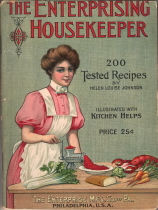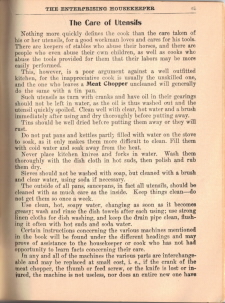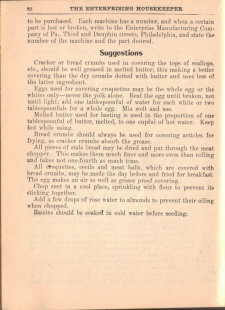 Here are pages 81 and 82 from the vintage booklet The Enterprising Housekeeper, the sixth edition (1906).
Here are pages 81 and 82 from the vintage booklet The Enterprising Housekeeper, the sixth edition (1906).
The Care of Utensils
Nothing more quickly defines the cook than the care taken of his or her utensils, for a good workman loves and cares for his tools. There are keepers of stables who abuse their horses, and there are people who even abuse their own children, as well as cooks who abuse the tools provided for them that their labors may be more easily performed.
 This, however, is a poor argument against a well outfitted kitchen, for the inappreciative cook is usually the unskilled one, and the one who leaves a Meat Chopper uncleaned will generally do the same with a tin pan.
This, however, is a poor argument against a well outfitted kitchen, for the inappreciative cook is usually the unskilled one, and the one who leaves a Meat Chopper uncleaned will generally do the same with a tin pan.
Such utensils as turn with cranks and have oil in their gearings should not be left in water, as the oil is thus washed out and the utensil quickly spoiled. Clean well with clear, hot water and a brush immediately after using and dry thoroughly before putting away.
Tins should be well dried before putting them away or they will rust.
Do not put pans and kettles partly filled with water on the stove to soak, as it only makes them more difficult to clean. Fill them with cold water and soak away from the heat.
Never place kitchen knives and forks in water. Wash them thoroughly with the dish cloth in hot suds, then polish and rub them dry.
Sieves should not be washed with soap, but cleaned with a brush and clear water, using soda if necessary.
The outside of all pans, saucepans, in fact all utensils, should be cleaned with as much care as the inside. Keep things clean–do not get them so once a week.
Use clean, hot, soapy water, changing as soon as it becomes greasy; wash and rinse the dish towels after each using; use strong linen cloths for dish washing, and keep the drain pipe clean, flushing it often with hot suds and soda water.
Certain instructions concerning the various machines mentioned in the book will be found under the different headings and may prove of assistance to the housekeeper or cook who has not had opportunity to learn facts concerning their care.
In any and all of the machines the various parts are interchangeable and may be replaced at small cost, i.e., if the crank of the meat chopper, the thumb or feed screw, or the knife is lost or injured, the machine is not useless, nor does an entire new one have to be purchased. Each machine has a number, and when a certain part is lost or broken, write to the Enterprise Manufacturing Company of Pa., Third and Dauphin streets, Philadelphia, and state the number of the machine and the part desired.
Suggestions
 Cracker or bread crumbs used in covering the tops of scallops, etc., should be well greased in melted butter; this making a better covering than the dry crumbs dotted with butter and uses less of the latter ingredient.
Cracker or bread crumbs used in covering the tops of scallops, etc., should be well greased in melted butter; this making a better covering than the dry crumbs dotted with butter and uses less of the latter ingredient.
Eggs used for covering croquettes may be the whole egg or the whites only–never the yolk alone. Beat the egg until broken, not until light; add one tablespoonful of water for each white or two tablespoonfuls for a whole egg. Mix well and use.
Melted butter used for basting is used in the proportion of one tablespoonful of butter, melted, to one cupful of hot water. Keep hot while using.
Bread crumbs should always be used for covering articles for frying, as cracker crumbs absorb the grease.
All pieces of stale bread may be dried and put through the meat chopper. This makes them much finer and more even than rolling and takes not one-fourth as much time.
All croquettes, cecils and meat balls, which are covered with bread crumbs, may be made the day before and fried for breakfast. The egg makes an air as well as grease proof covering.
Chop suet in a cool place, sprinkling with flour to prevent its sticking together.
Add a few drops of rose water to almonds to prevent their oiling when chopped.
Raisins should be soaked in cold water before seeding.
 More Recipes For You To Enjoy:
More Recipes For You To Enjoy:



